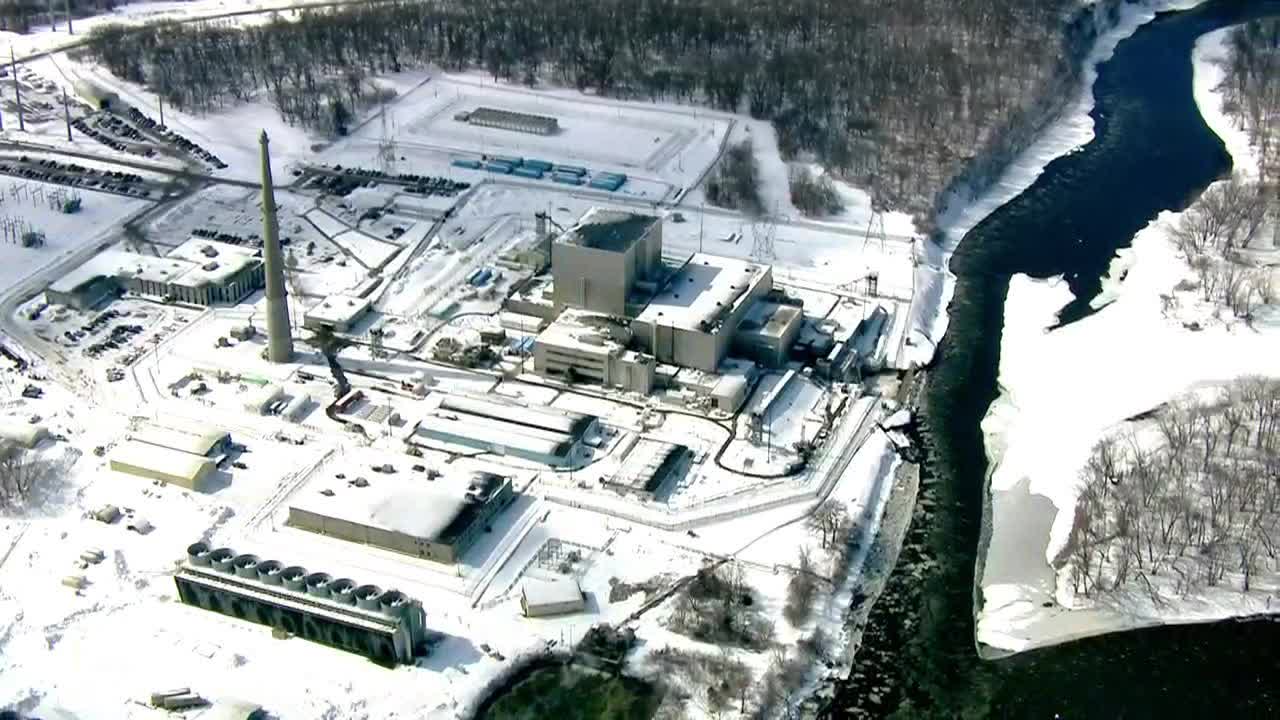NRC official: Monticello nuclear leak ‘does not affect public health and safety’
[anvplayer video=”5169055″ station=”998122″]
Nuclear Regulatory Commission officials reassured the Monticello community Wednesday that drinking water is safe following a leak of radioactive water at the Monticello Nuclear Generating Plant.
The federal regulatory agency held a public meeting at the Monticello Community Center about Xcel Energy’s application to renew its operating license for 20 years. The plant’s current license expires in 2030.
“We’re committed to operating a safe plant for the next 20 years and being able to help the state meet its 100% by 2040 carbon-free energy goal,” said Chris Clark, Xcel’s President for Minnesota, North Dakota and South Dakota.
In mid-November, an on-site monitoring well right under the plant detected a concerning level of tritium, which is a radioactive form of hydrogen that occurs as byproduct of the reactor. The leak was immediately reported to federal regulators, according to NRC officials.
“What we’re saying is the leak does not affect public health and safety,” said Valerie Myers, a radiation protection inspector for the NRC. “We’re not saying we’re OK with them just leaking a bunch of tritium into the groundwater — that is not the case. They have to deny it, stop the leak and start remediation. It’s just the safety impact of it is not significant.”

Chopper 5 captures the Monticello Nuclear Generating Plant from the air on Friday, March 17, 2023. (KSTP)
Xcel located the leaking pipe in December after inventorying more than 170 possible other sources. The company drilled into a concrete wall to insert a camera to determine the cause of the leak.
“There was no way to identify this visually, so what they started doing from day one is they started looking at the chemical analysis in the groundwater to identify where in the plant it may be coming from,” explained Myers. “Would it typically take this long to identify? In most cases, no. But most of these have been a leak that had a visual indication or something that was easier to identify.”
An NRC report from 2021 shows there has been a tritium leak at 38 U.S. Commercial Nuclear Power Plants over the past few decades, including a small leak at the Monticello plant in 2009. Based on that report, the November leak would become the sixth-highest recorded, with tritium levels of 5 million picocuries per liter.
“We don’t compare sites to each other because each example is different, so we can’t just compare one to another. There’s too many differences to do that,” Myers said. “When you do the math to look at the total activity that leaked, it comes out to about 8 curies. There are exit signs out there that run off tritium to help them glow that contain 25 curies.”
She added, “It sounds like a lot when you’re talking that big of a number, but when you’re looking at what theirs is and the health impact, it is not there.”
According to Myers, the NRC is closely watching the migration of tritium to ensure it doesn’t reach the Mississippi River. State regulators and Xcel Energy are adamant the water has not left the plant site and did not reach the Mississippi nor affect drinking water.
“We are watching that because the ground flow is towards the Mississippi, and they are remediating, and by remediating, I mean extracting the contaminated water below the building,” she said. “That’s slowing the migration.”
Xcel continues to pump the water out of the ground. The company is reporting progress from last week, when it had recovered 25% of the water that leaked.
“We continue to pump water,” said Clark. “We’ve recovered about 32% of the tritiated water. At this point, we’re taking a slow and steady approach, so this could take up to a year, actually even longer, but we’re just focused on getting it done.”
A handful of community members attended Wednesday’s meeting to gather information.
William Fair, a former Monticello City Council member, called Xcel “a good neighbor” to the community.
“I’m assuming that will continue,” said Fair. “I would just like to make sure that as this progresses, the term ‘nuclear leak’ doesn’t become a dog whistle to create havoc in the community. I think we need cool heads to look at the issues facing us and proceed in a manner that needs to be taken to resolve the issues.”
Xcel plans to remove the pipe where the leak was located and send it to a lab for testing.
“Did this pipe leak even though they were doing all of the preventative maintenance and everything they should’ve be doing?” Myers said. “Or was there an underlying issue the pipe leaked because? We don’t have that information right now. They will be taking out this section of pipe here in a little bit. We’ll find out more information and assess that at that time.”
The NRC will consider this leak as it continues the environmental review process for the plant’s license renewal application. A decision on the license is expected in November 2024 after both environmental and safety reviews have been completed.
The federal agency is accepting public comment until April 10.